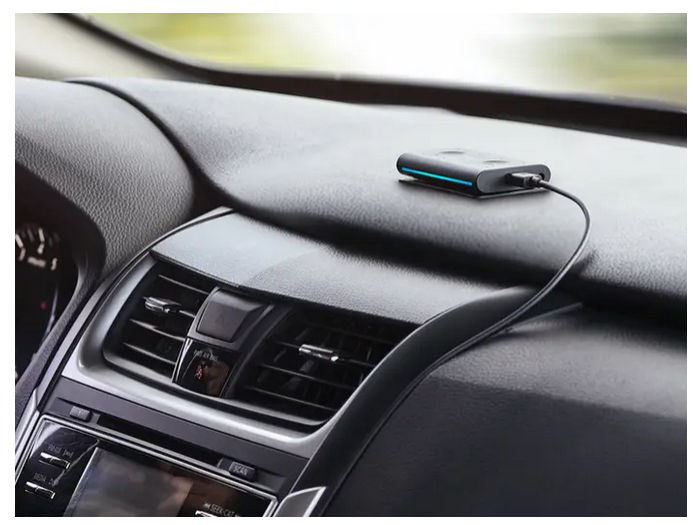Voice Will Transform In-Car Media. Someday.

Like many devoted smart speaker owners, now that Amazon's Alexa and Google Home have transformed how I consume media at home, I crave the same convenience in my car. Americans spend nearly 11 hours per week behind the wheel and I'm no exception. And, as a media reporter and voracious consumer of all-things audio, I want to turn my SUV into a voice-controlled media center. So, when Amazon started pre-orders for its first Alexa for the car, the Echo Auto, I clicked "buy" immediately.
More and more consumers are making voice-controlled speakers a part of their daily routine. About one in five Americans own a smart speaker and one-third of those have three or more devices, mostly in homes and offices, according to the latest Smart Audio report from Edison Research and NPR. This holiday season, Echoes, Google Homes, and other voice-controlled devices are once again expected to be top gifts, which should lift penetration even higher.
In contrast, voice technology in cars has been slow to materialize. A few automakers, including BWM and Ford, have integrated Alexa into their infotainment systems. GM, Toyota, and several more manufacturers plan to add the Amazon assistant into upcoming models in response to consumer demand. For now, most vehicle voice systems — including mine — are clunky, unresponsive, and nothing like the smooth exchanges Alexa and I have in my kitchen.
Until more automakers integrate Alexa into their vehicles, the Echo Auto offers audiophiles and curious early adopters a way to bring Alexa along for the ride. The $30 device connects to a smartphone and is controlled through the vehicle's Bluetooth. The size of a box of Tic-Tacs, the slick black device can be mounted on your dash or rest inside a cupholder, which can then be plugged into your USB jack or 12V socket. Like other Echo devices, users set up the device through the Alexa app, but it uses your data plan to connect to the Internet.
The Echo Auto is a small but significant development in the rapidly growing voice ecosystem, where brands are beginning to experiment with voice ads. Streaming giant Pandora, for example, recently launched voice ads with familiar consumer brands, such as Wendy's and DiGiorno's pizza, while Spotify is tinkering with voice-controlled, interactive ads, including with men's body spray Axe and its own Spotify Studios.
The car is the next frontier for voice. Drivers are near the point of purchase for consumer goods, entertainment, food, and services as they weave their way through town commuting or running errands. Marketers can deliver targeted voice ads to particular consumers based on demographics, location, and spending habits. They can tailor promotions and special offers, and even offer convenient voice-controlled ordering.
For content producers, in-car voice integrations can deliver new audiences for their content and provide opportunities for customized programming, such as traffic, travel, and weather. For podcasters, long drives can be perfect for in-depth and multi-episode podcasts, and even for sponsored content that works with travel and commuting-related brands. These are just a handful of possibilities.
For Alexa devotees such as myself, the Echo Auto is a way to extend your relationship with Alexa to your car. If you're like me and spend hours per day in your vehicle, this is a major improvement for in-car connectivity. However, like many new gadgets, the Echo Auto has a way to go; the seamless, in-car voice experience is still elusive.
In theory, I can now ask Alexa to access skills and answer questions, just like I do at home. I can potentially order groceries or pizza via voice while running errands. I could book plane tickets and hotel rooms. I should be able to start a podcast in the car and pick it up on my kitchen speaker without missing a word.
In reality, Alexa isn't the ideal copilot. Although the installation went smoothly, interacting with the Echo Auto is challenging. On an average drive, about half the time I request Alexa to play a song or a podcast, the Echo doesn't respond. Sometimes, she tells me she can't perform the task, so I know that the device is active, just not responsive. It's outfitted with multiple microphones, so it does well in picking up my commands, but it doesn't execute nearly as well as Echo, Echo Dot, or Google Home devices.
As a result, I end up streaming podcasts through my Bluetooth and ask my iPhone assistant, Siri, to help with basic functions. The Echo Auto may not be my last experiment with in-car voice integrations, and future generations will assuredly work better. Still, it is a welcome first step. For drivers, voice technology is still a promising way to safely and conveniently access media, while brands and audio producers will find expanded — and captive — audiences for their messages and content.
Click the social buttons to share this story with your friends and colleagues.
The opinions and points of view expressed in this content are exclusively the views of the author and/or subject(s) and do not necessarily represent the views of MediaVillage.com/MyersBizNet, Inc. management or associated writers.


